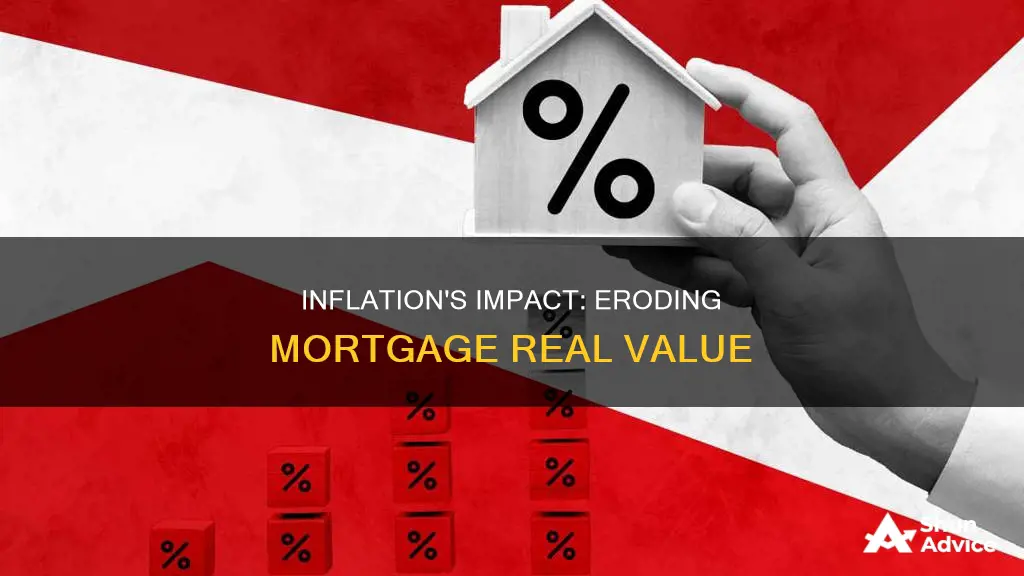
Inflation is a multifaceted issue that significantly impacts mortgages and the broader economic landscape. While it can erode the purchasing power of individuals, causing them to allocate more money towards essential expenses like rent, mortgage, and utilities, it also has a direct relationship with interest rates and the money supply. This complex interplay between inflation, interest rates, and the money supply holds the key to understanding how high inflation influences the real value of mortgages.
What You'll Learn

Inflation erodes the value of fixed incomes
For example, if an individual has a fixed income of $1,000 per month and the inflation rate increases by 10%, their income will effectively be reduced as the general price level of goods and services will now be higher. This can result in a decrease in their standard of living as they may no longer be able to afford the same goods and services with their fixed income.
Similarly, inflation can erode the value of fixed-income investments, such as bonds and certificates of deposit (CDs). This occurs because the interest rates on these investments are often fixed, and when inflation causes interest rates to rise, the value of existing fixed-income investments decreases. This can result in financial losses for investors, especially if they need to sell their investments prematurely.
Additionally, inflation can affect the value of mortgages. While inflation can reduce the real value of a mortgage, making it easier for borrowers to pay off their loans, it can also increase the interest rates on mortgages, making it more difficult for borrowers to make their payments. Overall, inflation has a complex impact on the economy and can affect different individuals and investments in various ways.
Mortgage Debt: A Divorce Complication
You may want to see also

The impact of rising interest rates
Rising interest rates have a significant impact on mortgage holders, especially when coupled with high inflation. Firstly, it is important to understand that mortgage contracts are typically specified in nominal terms, meaning they do not account for inflation. As a result, when inflation increases, the value of the outstanding mortgage is directly reduced by the inflation rate. For example, with 10% inflation, a £200,000 mortgage in nominal terms will be worth approximately £180,000 in real terms. This benefit for borrowers is often referred to as inflation eroding the real value of their mortgage.
However, the impact of rising interest rates can offset this benefit. When the central bank, such as the Federal Reserve in the US or the Bank of England in the UK, raises interest rates, mortgage rates tend to follow suit. This leads to higher monthly mortgage payments for borrowers. For example, a 1-percentage point rise in interest rates on a £200,000 mortgage can result in an additional £2,000 per year in interest payments, or almost £170 per month. This increase in interest payments can be a significant burden for households, especially when coupled with high inflation, which increases the cost of living.
In response to rising interest rates and inflation, borrowers may consider various options to mitigate the impact. Some may opt to refinance their mortgages to take advantage of lower interest rates before they increase further. Others may explore different types of mortgages, such as switching from a variable-rate to a fixed-rate mortgage to lock in a lower rate for a specified period. Additionally, borrowers may need to consider extending the life of their mortgages to reduce monthly payments or explore options for forbearance or reduced capital repayments offered by lenders.
While rising interest rates can have a significant impact on mortgage holders, it's important to note that the relationship between interest rates and inflation is complex. Central banks, such as the Federal Reserve, aim to keep both inflation and interest rates low and stable. They use various tools, such as adjusting the federal funds rate in the US, to influence interest rates and manage inflation. However, their decisions are based on a range of economic factors, and predicting the future path of interest rates and inflation is challenging.
Understanding Mortgage and Title Search: What You Need to Know
You may want to see also

How inflation affects the cost of borrowing
Inflation can affect the cost of borrowing in several ways. Firstly, when inflation causes prices to increase, the demand for credit goes up as more people seek loans to purchase big-ticket items. This increased demand for credit leads to higher interest rates, benefiting lenders. For example, if the price of a television rises due to inflation, the lender earns higher interest on the increased price. Additionally, borrowers may take longer to repay their loans, allowing lenders to accumulate interest over a more extended period.
However, it's important to note that lenders may also be negatively impacted by inflation if they are repaid in currency that has lost purchasing power compared to when the loan was initially issued. Inflation can erode the real value of both income streams and fixed payments. In the context of mortgages, high inflation can reduce the real value of a mortgage over time. For instance, a £200,000 mortgage in 2021 could, in effect, be worth £168,000 in 2023 due to inflation, even without any capital repayment by the borrower. This phenomenon is more pronounced with higher inflation rates.
While inflation can reduce the real value of outstanding mortgages, it is essential to consider the impact of interest rates. Mortgage interest rates are influenced by various factors, including central bank policies, market uncertainty, and inflation. During periods of high inflation, central banks may increase interest rates to curb rising prices, which can lead to higher mortgage rates. For example, in 2022, the average mortgage interest rate on a 30-year fixed-rate mortgage in the United States rose to 5%, coinciding with an 8.5% annual inflation rate.
The impact of inflation on the cost of borrowing also depends on the income and spending habits of borrowers. Inflation typically leads to an increase in the cost of living. If wages do not increase at the same rate as inflation, individuals may have less disposable income to allocate towards debt repayment. As a result, borrowers may need more time to repay their debts, benefiting lenders through extended interest accumulation. However, if inflation outpaces wage growth by a significant margin, borrowers may struggle to meet their debt obligations, leading to higher default rates, which can negatively impact lenders.
In summary, inflation affects the cost of borrowing by increasing the demand for credit, driving up interest rates, and impacting the real value of both loans and repayments. The interplay between inflation, interest rates, and wage growth influences the overall cost of borrowing for individuals and the profitability of loans for lenders.
EveryDollar Mortgage: Tracking Your Mortgage Paydown
You may want to see also

The impact on lower- and middle-class households
Lower- and middle-class households are often negatively impacted by inflation. When prices increase, the cost of living also increases. This means that people have to spend more money on basic necessities, leaving them with less disposable income. If wages do not increase to match the rate of inflation, people will experience a decrease in purchasing power. As a result, they may need to take longer to pay off their debts, allowing lenders to collect interest for a more extended period. However, if the cost of living becomes too high, people may default on their debts.
Inflation can also increase the demand for credit, as more people will want to borrow money to buy essential items. This increase in demand for credit raises interest rates, benefiting lenders. For example, if the price of a television increases from $1,500 to $1,600 due to inflation, the lender will make more money because 10% interest on $1,600 is more than 10% interest on $1,500. Additionally, it may take the borrower longer to pay back the loan, resulting in even more profit for the lender.
However, it is important to note that lenders may also be hurt by inflation if they are paid back in money that has lost purchasing power due to inflation. In other words, the money they get repaid may not be worth as much as the money they initially loaned out.
Inflation can also affect mortgages. Mortgage contracts are typically specified in nominal terms, which means they do not account for inflation. As a result, when inflation increases, the value of the outstanding mortgage is reduced. For example, a £200,000 mortgage with 10% inflation will have effectively fallen in value by about £20,000. This is because the money used to repay the mortgage is worth less than it was when the mortgage was taken out. In this way, inflation can help borrowers by reducing the real value of their monthly mortgage payments.
However, high inflation can also cause interest rates to rise, including mortgage interest rates. This can make it difficult for some households to keep up with their mortgage payments. In response to high inflation, the Bank of England may set interest rates above the inflation rate, further increasing borrowing costs. To help vulnerable borrowers, banks should consider adopting policies of forbearance, allowing households to suspend or reduce their capital repayments for a period of time.
Removing a Co-Signer from Your Mortgage: A Step-by-Step Guide
You may want to see also

How inflation influences the demand for credit
Inflation does not directly influence personal credit, but it can have indirect impacts on creditworthiness and household budgets. Inflation reduces the purchasing power of money, making goods and services more expensive. This can lead to increased debt as consumers may resort to using credit cards to cover expenses that their income cannot afford. Inflation can also cause unaffordable payments, where the increased cost of everyday necessities may result in late or missed payments, damaging credit scores.
During inflation, the demand for credit may increase as consumers seek to maintain their standard of living by borrowing money to cover expenses. This is particularly true for those on fixed incomes, such as pensioners and annuitants, who may struggle to keep up with rising prices. However, high inflation can also lead to decreased demand for borrowing due to higher interest rates, which make loans for large purchases more expensive. This decreased demand for credit can slow economic activity and decrease overall demand, as consumers become less willing to finance major purchases.
The impact of inflation on the demand for credit depends on various factors, including monetary policy decisions, the availability of goods, and consumer confidence. For example, supply shocks that disrupt production or raise production costs can lead to "cost-push" inflation, while demand shocks, such as a stock market rally or expansionary policies, can lead to "demand-pull" inflation.
Central banks play a crucial role in managing inflation and its impact on the demand for credit. They can implement contractionary policies to reduce aggregate demand, usually by raising interest rates. However, in situations of supply-driven inflation, such as pandemic-induced supply chain breakdowns, higher interest rates may not effectively address inflation issues. Instead, central banks may adopt experimental monetary policies such as quantitative easing and negative interest rates.
Overall, inflation can influence the demand for credit by affecting consumers' purchasing power and willingness to borrow. It is essential for individuals and businesses to manage their finances effectively during inflation to minimise the negative impact on their creditworthiness.
Fannie Mae's Mortgage Guarantee: How It Works
You may want to see also
Frequently asked questions
Inflation erodes the real value of mortgages as it reduces the value of outstanding loans. This is because mortgage contracts are specified in nominal terms and do not account for inflation.
Inflation affects mortgage rates as interest rates usually rise with inflation. This is because the demand for credit increases with higher prices, which raises interest rates and benefits lenders.
Inflation can help borrowers as it reduces the real value of their mortgage. However, if interest rates rise faster than wages, borrowers may experience a decrease in purchasing power, making it harder to pay off debts.
Inflation can benefit lenders by increasing the number of people seeking credit to buy big-ticket items. Higher prices also mean lenders earn more interest. However, lenders may be hurt by inflation as they are paid back with money that has less purchasing power than the money they loaned out.







